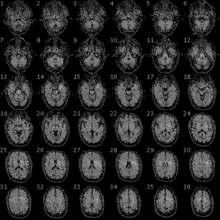Personal Genome Project
The Personal Genome Project (PGP) is a long term, large cohort study which aims to sequence and publicize the complete genomes and medical records of 100,000 volunteers, in order to enable research into personal genomics and personalized medicine. It was initiated by Harvard University's George M. Church and announced in 2005.[1][2][3] As of August 1, 2014, more than 3,500 volunteers have joined the project. Volunteers are currently accepted if they are permanent residents of the US, Canada or the UK, and are able to submit tissue and/or genetic samples. The Project is planned to launch for Europe and in development for South America and Asia.

The project will publish the genotype (the full DNA sequence of all 46 chromosomes) of the volunteers, along with extensive information about their phenotype: medical records, various measurements, MRI images, etc. All data will be placed within the public domain and made available over the Internet so that researchers can test various hypotheses about the relationships among genotype, environment and phenotype.
An important part of the project will be the exploration of the resulting risks to the participants, such as possible discrimination by insurers and employers if the genome shows a predisposition for certain diseases.
The Harvard Medical School Institutional Review Board requested that the first set of volunteers include the principal investigator George Church and other diverse stakeholders in the scientific, medical, and social implications of personal genomes, because they are well positioned to give highly informed consent. As sequencing technology becomes cheaper, and the societal issues mentioned above are worked out, it is hoped that a large number of volunteers from all walks of life will participate. The long-term goal is that every person have access to his or her genotype to be used for personalized medical decisions.
The first ten volunteers are referred to as the "PGP-10". These volunteers are:
- Misha Angrist, Duke Institute for Genome Sciences and Policy [4]
- Keith Batchelder, Genomic Healthcare Strategies [1]
- George M. Church, Harvard
- Esther Dyson, EDventure Holdings
- Rosalynn Gill-Garrison, Sciona [2]
- John Halamka, Harvard Medical School [3]
- Stan Lapidus, Helicos BioSciences [4]
- Kirk Maxey, Cayman Chemical [5]
- James Sherley, Boston stem cell researcher.
- Steven Pinker, Harvard
In order to enroll, each participant must pass a series of short online tests to ensure that they are providing informed consent.[5] By the end of 2012, more than 2000 participants had enrolled in the Harvard PGP. As of August 1, 2014, more than 3,500 volunteers have joined the project.
The PGP is establishing an international network of sites, including the United States (Harvard PGP), Canada (University of Toronto / Hospital for Sick Kids), and other countries that adhere to certain "conforming implementation" criteria such as no promise of anonymity and data return.[6]
See also
References
- ^ Church, G. M. (2005). "The Personal Genome Project". Molecular Systems Biology. 1 (1): E1–E3. doi:10.1038/msb4100040. PMC 1681452. PMID 16729065.
- ^ Emily Singer. The Personal Genome Project, Technology Review, 20 January 2006
- ^ Duncan, David (2010-06-07). "Scientist at Work: George M. Church - On a Mission to Sequence the Genomes of 100,000 People". The New York Times. Retrieved 2010-08-18.
- ^ Misha Angrist, Robert M. Cook-Deegan Who Owns the Genome? The New Atlantis, Number 11, Winter 2006, pp. 87-96.
- ^ Emily Singer. Your Personal Genome, Technology Review, 6 December 2007
- ^ "Personal Genome Project".
